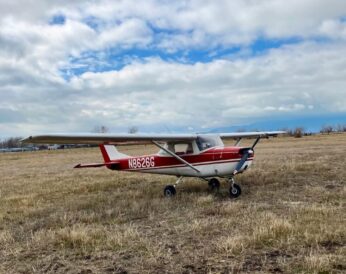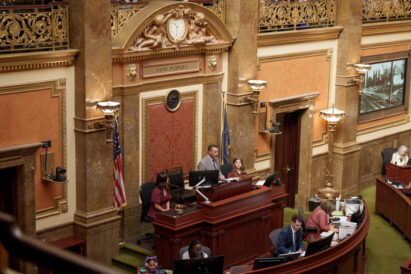Utah County’s first teen center at Polaris High School amplifies resources for students facing adversities
- The Hub, one of the resource rooms designed for the new teen center at Polaris High School, is shown on Oct. 2, 2024.
- A pantry stocked with canned food items and essentials inside the teen center at Polaris High School is shown on Oct. 2, 2024.
- The Hub, one of the resource rooms designed for the new teen center with laundry facilities at Polaris High School, is shown on Oct. 2, 2024.
- The Daycare inside of the teen center at Polaris High School is shown in an undated photo.
- The Zen Den, a mental wellness space inside the teen center at Polaris High School, is shown on Oct. 2, 2024
- An undated photo shows available resources inside the new teen center at Polaris High School.
- On Oct. 2, 2024, Polaris High School held a community open house for its new teen center.
The Alpine School District serves more than 85,000 students across most of Utah County, some of whom come from diverse circumstances with a variety of needs.
With that in mind, the district has opened Utah County’s first teen resource center at Polaris High School in American Fork.
With an original location in Orem, the alternative school opened its American Fork campus in 2019.
The new teen center is designed to provide student wellness, readiness and essential services with emotional, physical and academic benefits.
Facilities are open during normal school hours for students of Polaris and Summit High School, which is located next door.
For nonstudents, teen center staff will work with other Utah County cities and schools to find supportive solutions.
The new center helps students facing housing insecurity with food, basic home items and laundry supplies.
While the teen center does not offer overnight services for students needing shelter, school-based therapists and counselors can work with partnering agencies to identify safe and appropriate accommodations.
Polaris received a $250,000 grant last year from the Policy Project, a Utah nonprofit that worked with the Utah Legislature and private partners to create funding to develop teen resource centers throughout the state.
The school used the funding to design and build six new spaces in the center where students can access basic items, helping alleviate burdens that can deter a productive school experience.
These new rooms fit into four different components of support:
- The Hub, where student can access laundry facilities, hygiene products and food to take home to prepare.
- The Learning Lab, an academic support space.
- The Daycare, which allows students with children to attend class while their infants and toddlers receive excellent supervision and care.
- The Zen Den, a calming space where students can practice self-regulation and return to learning activities when emotionally and mentally ready.
The Zen Den was already an established resource at Polaris as a wellness space, but with the expansion of the Teen Center this year, the Zen Den was moved and upgraded.
Teen Center Coordinator Linda McCoy said after Polaris was awarded the grant a little over a year ago, school officials went into the planning and design phase of what they felt the center should be to accommodate their students.
“We needed to create a space where the students could have the wellness room. We needed a space where we could have a washer, dryer, fridge and all the basic necessities. We also wanted to add on the Learning Lab, which is the academic piece, and then we were able to increase the Daycare and all of the services there,” McCoy said during an open house event on Wednesday.
Construction on the new rooms started during the summer break and were ready for students at the start of the new school year. Students are already taking advantage of the services.
“Already, we’re seeing great success as far as what the students are taking, what they’re utilizing,” McCoy said.
Items like deodorant and other hygiene products that many individuals may take for granted have been a hot commodity in the short time the center has been open, according to Hannah Figueiredo, Polaris High School principal.
“Over 150 deodorants have been handed out already. Laundry facilities are helpful for students who don’t have a washer and dryer at home. One student works in food service after school and is able to wash his uniform at school. He had been spending $60 to $80 monthly to wash his clothes at a laundromat,” the release noted.
Resources also include a pantry stocked with canned goods, peanut butter and jelly, and instant potatoes, among other food items, and essentials like soaps for handwashing and laundry.
A grab-and-go cart allows students to obtain items such as lotion, hand sanitizers, personal grooming accessories and school supplies.
Clothing items like coats have also been donated to help keep students warm during the cold winter months.
The Teen Center is clean, orderly and well-organized; Figueiredo said those factors are vital in helping students feel welcome to use the resources.
“As a teacher, administrator and as a school employee, sometimes it’s so overwhelming because you know your role is to educate, but when you’re interacting and you know someone’s story, you know that they’re bigger than just the math problem,” Figueiredo said. “And it’s so nice to be able to do the math and offer the food and cleanliness. Students come back, they attach, they connect, then they graduate.”
For students with young children, the teen center’s daycare allows them to balance their responsibilities and continue their education.
“So their children get full-time daycare services where they can have the nurturing and instruction, and the student can continue to attach still as they can still spend time with their children throughout the day, which is such an incredible opportunity,” Figueiredo said.
Polaris also offers transportation support, including car seats on buses, for young mothers who cannot drive, Figueiredo noted.
Prior to the center, she often feared students would not attend school due to hardship or adversity they were facing. Figueiredo said she now feels confident students will feel comfortable coming to school despite their obstacles because they know their needs will be met.
She’s excited that the grant money received through the Teen Center Project will help Polaris amplify school efforts to provide extensive support for its students.
Brooke Gledhill Wood, chief of staff at the Policy Project, said efforts to expand teen centers throughout the state began two years ago. She said a previous meeting with school officials from Polaris helped shape what the program could look like based on services the school was already providing.
“And so it’s really amazing to come back and see just how they were able to just supplement and even grow what they were already offering to their students,” Gledhiil Wood said.
In regard to what resources the different teen centers offer, it depends on the needs of their specific students.
“Every school is unique that applied for teen center funding. Like, I think this is the only teen center we’ve seen that has a daycare. It kind of depends on the needs of each student body at each school … a really cool part of the program is that schools can really envision what’s best for the needs of their students,” Gledhill Wood told the Daily Herald.
Having this resource in Utah County within the largest school district is significant in helping connect students and their families to broader community resources, she said.
Polaris High School serves about 180 students in 11th and 12th grade from across the Alpine School District; its enrollment can fluctuate during the year. Its students must be referred by a traditional district high school.

















